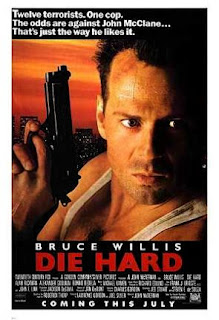It's kind of like the song from White Christmas...what do you do with a former CIA black-ops agent when he stops being a CIA black-ops agent? Well, if you are Frank Moses (Bruce Willis), and you are living an inoffensive existence as a lonely retiree whose only friend is a customer service representative at a bank several states away, the answer is simple: kill him. For reasons unknown to him, Frank discovers that his status in the intelligence community has been changed from "retired" to RED ("retired, extremely dangerous"). Being RED means that assassination squads infiltrate your home in the middle of the night, looking to terminate with extreme prejudice. However, the "extremely dangerous" bit is an understatement; Frank quickly kills his attackers and begins a quest to find out who wants to kill him and why.
Along the way, Frank has to pick up that bank representative, Sarah (Mary-Louise Parker). He realizes that his phone must have been tapped prior to the assassination attempt and that the next logical step for the bad guys would be to kidnap Sarah and use her as leverage against him. She's not very willing at first, but as more people keep showing up to kill her, Sarah quickly gets on the Frank Moses bandwagon. Frank can't unravel the plot against him all by his lonesome, though, which means he needs to find help. Since he's retired, it turns out that his help is also a little past their prime. Joe (Morgan Freeman), Frank's mentor, is now living in a retirement home and passes the time by ogling his nurse's ass. Marvin (John Malkovich) is a well-armed conspiracy theorist that is paranoid to the extent of having a decoy house. Victoria (Helen Mirren) is a prim and proper housewife, formerly the best wetworks specialist in the business. With a little help from Ivan (Brian Cox), a Russian spy and former adversary, the group sets out to learn the truth.
 |
| I so so so wish he yelled "Flava Flaaaaav!" here. |
I was excited to see this movie after seeing the trailers for it. It didn't look like a great action movie --- it has Morgan Freeman and Helen Mirren, remember? --- but I thought it looked funny. I was wrong. It is funny and a good action movie. This is one of Willis' more wooden roles, but I don't know if I would have bought a black-ops specialist with a talent for wisecracks. His stoicism was probably for the best. Morgan Freeman and Helen Mirren clearly had a lot of fun in their roles, with Mirren taking particular relish in being the gun expert. I go back and forth with my appreciation for John Malkovich, but he plays a pretty amusing paranoid here. Malkovich was probably my favorite character in the film, but I also really enjoyed Brian Cox. I think I just like the idea of former arch-enemies getting together and reminiscing about "the good old days," when they used to try to kill each other. Cox doesn't get nearly enough comic work, in my opinion. Mary-Louise Parker was also good as the relative newbie to all the danger. Is it just me, or was Parker neither attractive or talented until she turned 40? Weird. I liked seeing Ernest Borgnine again, even if he wasn't threatening to shoot anyone in the face. The rest of the cast was kind of meh. James Remar was in the movie for all of two seconds. Rebecca "Mrs. David Mamet" Pidgeon and her ugly jaw was as awful as she usually is, as was Richard Dreyfuss in his small-but-overacted role. I'm not exactly sure why Julian McMahon took his small part in the film, but he was definitely many years too young for the character he played. The bulk of the meh comes from Karl Urban, though. While I appreciate his dedication to the action movie genre, Urban is best when he speaks little and doesn't develop as a character. Here, he tries to actually act, with little to show for it.
 |
| Though this isn't from Red, Ernest Borgnine is still awesome. |
This movie shouldn't be as good as it is. The screenwriters that adapted this story from the comic book series are the same people who wrote the dreadful Whiteout. The director, Robert Schwentke, has never shown a talent for either action or comedy, with his only other English films being The Time Traveler's Wife and Flightplan. Somehow, those films managed to collectively gross over $300 million and still have absolutely zero appeal to me. Regardless, the script was smart, the actors were directed well, and the action was pretty cool. I don't think I've ever seen so many bullets fired into one suburban home before, but I liked it.
Probably the thing I appreciated most about this movie was that it didn't keep calling attention to the age of its characters. Aside from an assassin calling Malkovich "old man," and maybe a similar remark made during a Willis-Urban fight, age was not a joke in this movie. Thank you, screenwriters. Instead, the humor was largely contextual and delivery-based. The main actors were all very good, and only the bad guys weren't funny. The pace is quick, the action is good, and many things go boom. This is exactly what From Paris With Love should have been, but was not. I will go so far as to say that Red is one of the most enjoyable action movies of 2010, and the perfect antidote for anyone who cannot fathom the success of The Expendables.



















